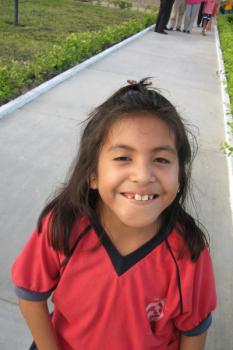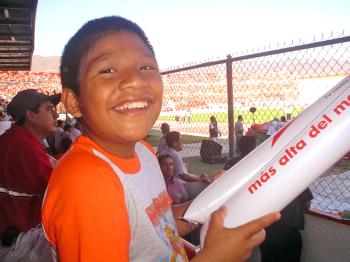In Chiapas, the fight for more social justice is by no means over

Tuxtla Gutiérrez is the capital of Chiapas State and has a population of over 550,000. The state of Chiapas, whose population consists to a large part of rural indigenous minorities, has historically been one of the poorest in Mexico, with much of the land in the hands of a few large estate owners
The high rates of poverty and social exclusion in Chiapas led to an armed popular uprising by the Zapatista Army of National Liberation which began in 1994. Their – now generally non-violent – struggle aims to improve living conditions for the indigenous population in the country, especially as regards land rights and control of resources. Their demand is that natural resources should benefit the people of Chiapas more directl
Without the right care, children with disabilities have little hope of becoming independent adults
The inequality of wealth distribution in Mexico is stunning: while in the northern state of Baja California, for example, food poverty is around 1.3 per cent, in Chiapas it is a high as 47 per cent. The rate of malnutrition is accordingly high in Chiapas. Poverty in terms of earnings capacity, i.e. the skills people have that allow them to make a living, is also highest in Chiapas, at 55.9 per cent. One of the reasons for this economic and social situation is the fact that public investment in rural, predominantly indigenous areas is still far below the national average.
Illiteracy amongst the indigenous population, at 25.5 per cent, is also higher than the national average of 9.2 per cent. Many indigenous communities are located in relative geographical isolation, without so much as paved roads that might allow them access to educational facilities.
Children born to young parents in rural areas, who often go on to have large families, are particularly vulnerable, especially when they have a disability. In many cases, parents do not have access to proper health care. Children with disabilities are also very frequently excluded from education, as there are not enough schools in the region that can meet their needs.
What we do in Tuxtla Gutiérrez

SOS Children’s Villages began its work in Tuxtla Gutiérrez in 2003 because there was no provision of therapy, treatment, activities and education for children with special needs in the region. The social centre here comprises a medical treatment centre, four training workshops, eight houses for outpatient treatment and a therapy centre for children with disabilities. The therapy centre offers different types of occupational, speech-, hydro- and physiotherapy.
The administration and financing of the social centre were handed over to the Government of Chiapas in 2006, so that SOS Children’s Villages could focus more on its fundamental task of ensuring the integral development of children in a family-setting.
At the children’s village, we have a multidisciplinary team composed of a doctor, a physical therapist, an occupational and speech therapist, a teaching specialist and a counsellor. Together, they contribute to the holistic rehabilitation and education of the children and young people.
Up to 72 children from the region who are no longer able to live with their parents can find a loving home in one of the nine SOS families here. In each family, the children live with their brothers and sisters and are affectionately cared for by their SOS mother.
There is also a school for children with special needs here, which started as an SOS Hermann Gmeiner School but is now run by local authorities.